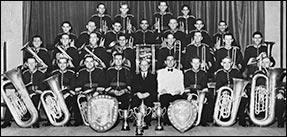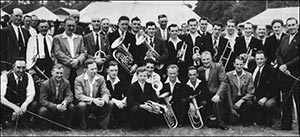MEMOIRS by W. A. SCHOLES
Could you have seen a small boy of nine years of age sitting on his father's box which held his best suit, listening to a concert given by the Rushden Temperance Band on the lawn of the Athletic Club? It could have been ME! 'W.A.S.'
Four years later, again standing beside the 'cornet player’ at the open-air meeting in Queen Street listening to the music of the seven or eight men and boys of the Salvation Army Band: 'it could have been ME’ again, for my ear was always attracted to the lovely sound of cornet, or euphonium, and Trombone. So it went on until 1918, to the night I received my first instrument in the Salvation Army Hall in Queen Street, and I nearly ran all the way home with that precious cornet in a case, quickly arriving at 74 Queen St, where I opened the case, took out the cornet, put it to my lips and blew into it!!! and found to my distress and horror no sound came out of that shiny bell; Oh great disappointment! But help was at hand for Albert Randall (who to me was an expert) quickly put it to his lips and Behold! a lovely sound was born.
So I quickly got the hang of it and learned to produce those beautiful silvery tones so pleasant to the ear.
Some months later the Bandmaster called and would I change the cornet for the Tenor Horn. Now the B/Master, although a kindly man would brook no interference and always wanted his own way, (and mostly got it) persuaded me to accept it.
My mother was furious, "If he thinks you are going to march around blowing that great 'Big Thing' he's got another think coming" she said, poor little W.A.S. cried bitterly, but I managed to keep the Tenor Horn and learned to play it really well.
Sometime later Wellingborough S.A. Band were booked to do a week-end in Yorkshire, and B/M Giles asked me to go with them. The solo horn player was H. Sharp and could not make a success of an obligato part no matter how he tried, so I was brought in.
I practiced that little obligato and when the first night of rehearsal came I was ready for it. I breathed a little prayer that I might do my best, so when the B/master's baton came down I played a perfect note, tone good and perfect style, but no one else had played, Phew! was my face red, they played with a delayed action, that is:- they came in at the end of the beat, whereas I had been used to coming in at the start of the beat.
 |
|
William in 1923
|
Still almost every time they had an engagement I was asked to go with them. Meanwhile I was commissioned as the Young Peoples Singing Company leader; then choir master (Songster Leader) and also Deputy B/Master; I seemed to fit in everywhere as, you see, I was what they call a Natural Musician.
Then I took up studies for the L.G.S.M. and the B.B.C.M. having valued help from a dear friend, Col. Goldsmith, a capable brass band composer. I am proud to say that I passed with honours, and soon after I was asked to play the Solo Euphonium. That seemed to complete my lot. I enjoyed my banding and conducting the Songster Brigade as we had a lovely and efficient effective brigade of singers.
The Band was booked to go to Highgate (London) for a week-end, and a few weeks before the date the B/Master fell ill so, being the deputy, I was to take over the rehearsals and concerts. The bandsmen responded so well to the change of Beat that they played magnificently and the programmes were well received. The Band was in top form at that time and were held in high esteem in 'Army circles'; Col. Goldsmith came to Highgate to listen to the band and congratulated us on the playing. I was so pleased that I felt 100% good: I felt that surely W. Giles being ill would make way for me now, but no! he returned to take over and I reverted to the D/Bandmaster and the euphonium. It caused unrest among the Band as future events will prove.
Just let me divert a little to mention two happy episodes that brought satisfaction to me just before the war.
1st. While I was Deputy I gathered together a number of the best players of the band and formed what we called a 'Second Series Band’ going around the neighbourhood giving concerts in chapels and for charity. One of the items in our programmes was a cornet duet which I myself had arranged, and was played from the manuscript bringing great applause from the listeners. The bandsmen enjoyed the concerts and the comradeship of their fellow players:
2nd. During the war when the band was depleted owing to joining the forces, and not able to fulfil engagements, I formed a quartette party and with the addition of an elocutionist we travelled many miles giving concerts and conducting services for a week-end. Places we visited were:- Denford; Yeovil S.A. week-end; Bozeat (twice); North Evington S.A.; Souldrop; Irchester chapel; Northampton S.A.; Leicester S.A; Wollaston, (twice); Irthlingborough chapel; Sheringham S.A. week-end; Bedford S.A; Highfield Baptist chapel; Sholing S.A. week-end; H/Ferrers Chapel; Langford S.A; Raunds Chapel, (twice); Finedon Chapel; Earls Barton, (chapel); Wellingborough S.A; Kettering S.A. and Godmanchester S.A., where we had a civic reception with the Mayor and Corporation, a great time, arriving home 23.55.
After the war I was troubled in mind knowing that my knowledge of music and Band conducting was not being used to my satisfaction, that, as the saying goes, 'When one door closes another opens'. In early 1947 I was busy in the coal yard, (being a coal merchant) one February Saturday morning serving my customers with their ration of 2 cwt of coal with snow 2ft deep, and the coal wet & cold to the touch, when who should come into the yard but George Sayer, euphonium player from the Temperance Band. I looked at him and he said "Would you be averse to coming and conducting our Band Bill?" My heart almost stopped; yet I went and conducted them and rehearsed 'Aknaton' by E. Ball, which they played at Nottingham Contest and won 2nd prize, so with that we qualified for the next contest at the 'Albert Hall'. I had never been in the place before, but I kept my nerve and carried through with dignity. And I learned some of the tricks of the trade which helped me a lot in the days to come. After that we went to the 'Albert Hall' 5 years in succession.
 |
Back row: Ernest Denton, John Brown, Alabert Roberts, Tony Ellis.
2nd row: - -, Ernie Abbott, Harry Hartwell, Sam Denton (drummer), Horace Hyde, Harold 'Hadge' Green, - -.
3rd row: Percy Long, Fred Dickerson, Cyril Tew, Walter Seamarks, Wm Clayton, Horace Howard, Ron Benning, Dennis Denton.
Front: Jack 'Ginner' Scholes, Cliff Denton, George Sayer, Frank Perkins, Wm Capon (President), W A Scholes (Musical Director), Bert Seamarks, Frank Abbott, Jack Sugars.
|
|
The Temperance Band with some of their Cups and Trophies about 1950
|
|
I enjoyed the experience of contesting, trying my luck with fourth section entrants, (Repham and Kibworth Bands), and as I gained experience and confidence other chances of conducting came my way. One of the first was to train & conduct Dearham Band. After that I was with Clydebank Burgh.
 |
|
Deiniolen Band - Bill is far right
|
Then came an invitation to judge at the famous Eistedford in Wales, and to conduct 'Park & Dare Band' which I did for some time, then a job for approx 15 years at Deiniolen, rather a poor band, but won many prizes and also many many dear friends, among them dear old Will Hughes, who has since passed away.
To recap to Clydebank Band, I'll tell you how it happened; I had friends Dan & Margaret & family, what a thrill it was, like going home, Usher Hall.
It seemed as if most of my invitations were coming from Wales so naturally I always shall keep Wales at the top of my list. A story of Belle Vue, Manchester and my stay there in the box (no knife & fork), and one instance to take Dunstan Band (Holland) Switzerland. Sometimes it happens to come awkward as did this night; I listened to 33 bands play the same piece. Then when you get home, you can hear it going through your head like this -------?
And so we come to Kibworth Band and their entry against Munn & Feltons works band. What a day that was; did we win? It was so good to read the report in the Evening Telegraph of our latest success, and that took us to the finals at the R.A.H. there we played so well that H.M. who was doing the commentary for the B.B.C. spoke of a very sound performance by the Band playing (number 9!); of course we didn't get in the prizes but it was a thrill to be mentioned.
One year we got so close we were in 6th position & that was famous; really good! Then Charlie came to see me one day and asked me to play him at billiards (story) Dear Charlie! what memories he brings back as I ponder over the scene. Do you remember Charlie Giles how he went around to his customers to sell his brushes, (Kleen-easy). Story of dinner, Brenda; Shirley; Pauline:
Then I had an invitation to go and listen to Towcester Band; they were only one week away from their contest; I listened & they asked me what I thought to the playing, I did not dare tell them just what I thought, but asked "Would you lend me the 'stick' for a few minutes; they did and I kept them on the first movement for 1½ hours, (the movement took 2½ minutes to play). Then in a few years they climbed right to the top, and in 11 years found themselves up against GUS Footwear Band and tied with them for the fifth position in the end, at De Montfort Hall. In 14 years I had taken them from 4;3;2;1, also did a couple of records. Today finds them going down-hill, which is a sad thing to say.
I remember that once I played at No.1 to an empty Hall, and was awarded 1st prize, also complimented on the rendering of the 'National Anthem’.
So I had brought two bands, (Kibworth & Towcester) from the 4th to the Championship Section, competing at the Albert Hall. So whatever they think or say I don't owe them anything and they still asked me to conduct the band at odd times.
I have had two wonderful farewells; one in 1981, and one in 1982 which brought my conducting days to an end.
So I said farewell to them all.
(l) Kibworth a farewell concert, with H. Mortimer in attendance,
(2) Towcester, a farewell dinner.
Coda? I would like to add my congratulations to a full and successful ‘Golden’ period of conducting. (Will)
(I feel that I've had a 'LENA' life than yourself.)
The above article was written by W. A. Scholes on his retirement from conducting. Kindly passed to us by his daughter, Ruth. The two notes above were added at the end of his article. It is possible that Bill intended to add something more; the paragraph about Charlie Giles seems unfinished?
|